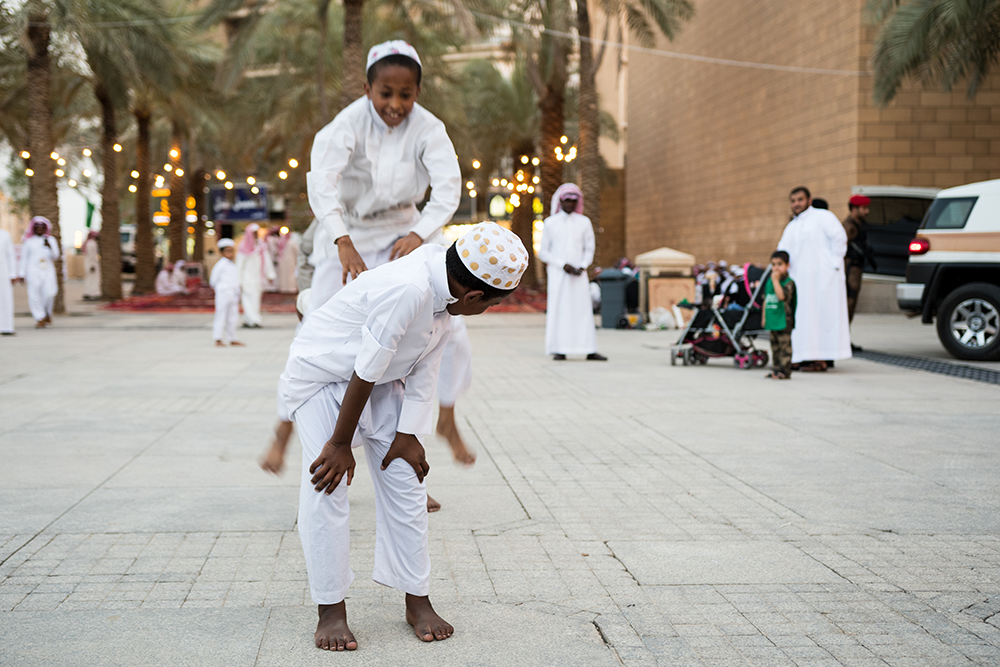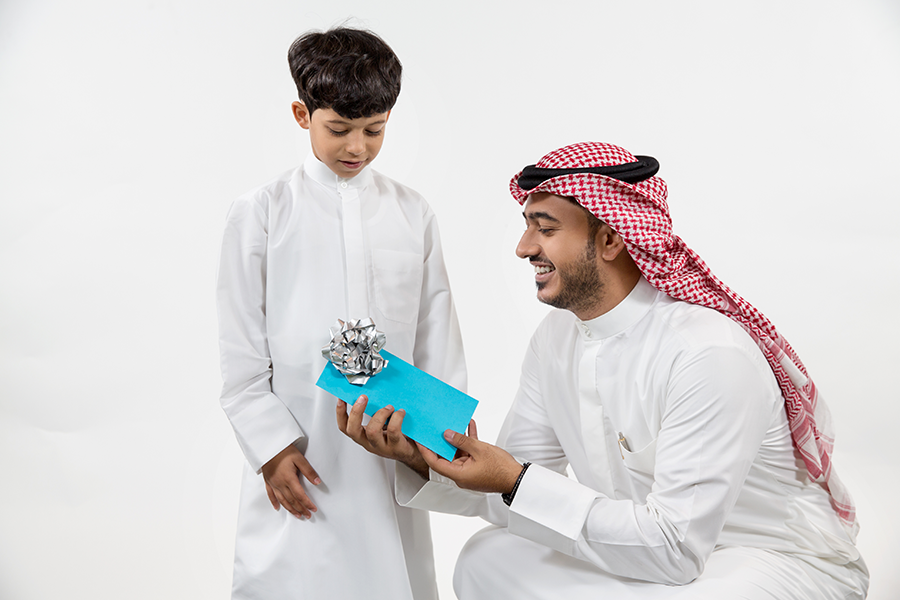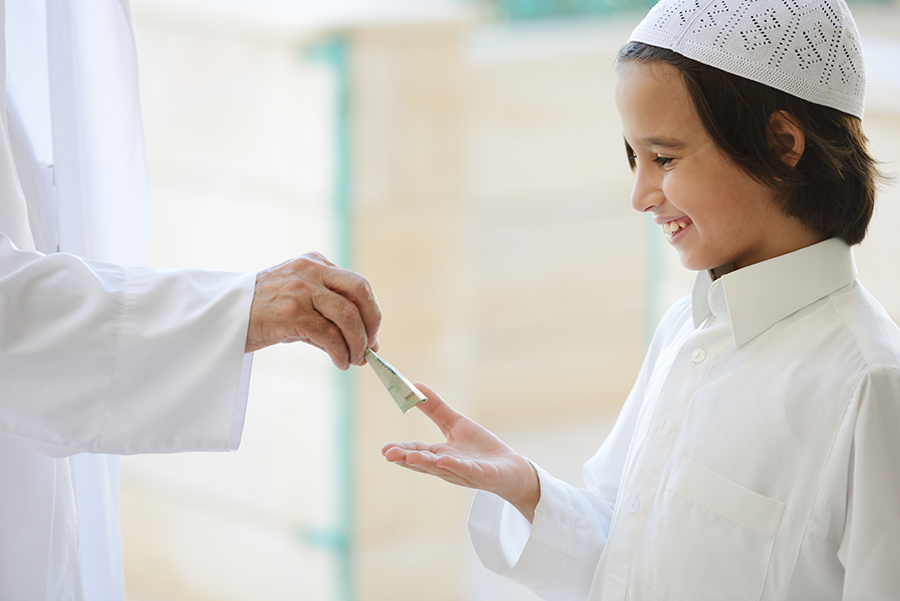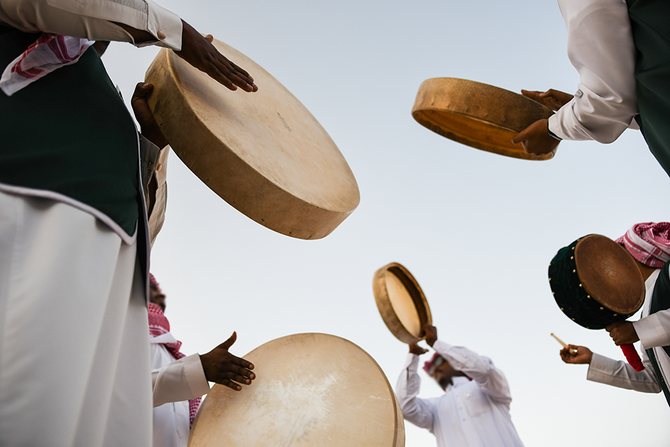KHAFJI/JEDDAH/MAKKAH: Last year’s Eid was limited to small celebrations at home due to the 24-hour curfew imposed across the Kingdom during the five-day holiday to tackle the coronavirus disease (COVID-19).
However, the situation has transformed this year, as people are more reassured and eager to celebrate the occasion with their families.
After a month of fasting and performing religious rituals, many are gearing up for Eid with morning prayers with their neighbors and breakfast feasts with close family.
The Hijazi feast, for example, is always full of traditional sweet and savory dishes such as the ta’ateemah, dibyaza, harees, ma’asoup, and fatoot bread.
All of these dishes are well known in the Hijaz region, where they are commonly prepared and served by grandmothers, to ensure that the whole family gathers on the first day.
Haneen Fahad, a mother in her 40s, said that Eid prayers are dear to many Saudis as it is the occasion’s first social gathering, where they meet and greet those living around them.
“One of the things I really admire is preparing some giveaway gifts for my kids to distribute to other kids at the mosque after Eid prayers,” she told Arab News.
She added that nothing can be compared to the spiritual, thrilling feeling of the first day. “There is so much fun. Once the whole family is gathered, a lot of activities start, where elder relatives start to distribute Eidiya money to kids and adults, families start to exchange gifts, and everyone looks neat, fresh and happy.”
After a morning full of food, money, gifts, new clothes, and fancy chocolates, Jeddawies tend to revive before the evening with what is colloquially referred to as the “Eid sleeping coma.”

Although the pandemic disrupted many celebrations, the Eid rituals remain unforgettable in the hearts of the people. They long for the smallest details of Eid, with its social legacies and many customs that have been passed down for generations and remain in their memories. (Supplied)
HIGHLIGHTS
• The Hijazi feast is always full of traditional sweet and savory dishes such as the ta’ateemah, dibyaza, harees, ma’asoup, and fatoot bread. All of these dishes are well known in the Hijaz region, where they are commonly prepared and served by grandmothers, to ensure that the whole family gathers on the first day.
• In the southern part of the Kingdom, specifically in the Jazan region, people start to prepare for Eid two weeks earlier. The region is famous for its popular traditional dishes that are nutritionally rich, such as stews, fish, ghee, honey, pickles and others.
• Although the pandemic disrupted many celebrations in Makkah and Taif, the Eid rituals remain unforgettable in the hearts of the people. They long for the smallest details of Eid, with its social legacies and many customs that have been passed down for generations and remain in their memories.
Shatha Bukhari, a student at Dar Al-Hekmah, told Arab News: “After everyone has been up all morning until noon, the city gets quieter in the afternoon as everyone enjoys their Eid ‘sleeping coma’ to recharge for the night.”
Jeddawis usually have a second round of feasting in the evening, enjoying a barbecue dinner at home. On the second day, however, they prefer to dine in a fine restaurant, said Bukhari.
From west to south
In the southern part of the Kingdom, specifically in the Jazan region, people start to prepare for Eid two weeks earlier.
Nahla Zameem, a Jazani mother of four who has a family house located in Jazan city, gave Arab News some insight into the region’s traditions. She said that Jazani Eid is more of a big wedding to its people.
The ladies like to celebrate Eid the traditional way, using jasmine flowers, henna dye, and wearing traditional jalabiya as a way to express happiness, beauty and elegance.
The jasmine flowers are made into crowns and wrapped around the hair, and some choose to wear big jasmine necklaces up to 1-meter long.

Although the pandemic disrupted many celebrations, the Eid rituals remain unforgettable in the hearts of the people. They long for the smallest details of Eid, with its social legacies and many customs that have been passed down for generations and remain in their memories. (Supplied)
The region’s ladies also book appointments with henna artists to decorate their arms and legs with temporary tattoos of different patterns. Henna is well-known in the Muslim world and is a reddish-brown dye made from the powdered leaves of a tropical shrub, used to color the hair and decorate the body.
The region is famous for its popular traditional dishes that are nutritionally rich, such as stews, fish, ghee, honey, pickles and others.
“Around 8 a.m. every Eid, all of the men in the neighborhood start to gather at my father’s house, where a huge breakfast is held, consisting of rows of popular food that may reach a length of a few meters, all of which is served in clay pots to give a wonderful authentic vibe,” Zameem added.
One of the things I really admire is preparing some giveaway gifts for my kids to distribute to other kids at the mosque after Eid prayers.
Haneen Fahad
One of the most essential traditional Jazani dishes for Eid breakfast is the salt fish, also common among Egyptians and Palestinians during the religious festival.
“We prepare salt fish almost a month earlier, where we clean the fish and stuff it with salt and preserve it by hanging it to dry under the sunlight. During Eid, we deep fry it for breakfast.”
Fireworks and folklore dances are also a big part of Eid celebrations in Jazan. Some of the famous dances are Jazani Ardha, or as Jazani people call it “Zlaf.”
Eastern Province corniche
In the Eastern Province, the corniche is a popular destination during Eid, with many having complete family visits and gatherings.
Mohammad Meshal, a young Saudi from Khafji, loves to spend the Eid among his family and relatives in his home, a small border town near Kuwait.
Before the COVID-19 situation, Meshal used to travel to Kuwait to go for walks and visit relatives, but precautions taken by the government put an end to his trips. But he is optimistic that despite the restrictions, “ traveling is not completely restricted, as I may travel again after May 17.”
Abdullah Al-Ayaf, a government employee, told Arab News that his family is used to corniche visits after the round of family gatherings are done. “I spend the first day of Eid somewhat officially, but on the second and third days, my family goes to the corniche, or we rent a small resort.”
DECODER
• Eidiya: Money that is usually given to children by elderly relatives, family, and friends as part of the celebration. The amount of money mostly varies from SR1 to SR500.
• Dibyaza: A dish made of melted dried apricots, roasted nuts, figs, peaches and sugary dates to create a marmalade-like dish that can be enjoyed with or without bread.
• Ta’ateemah: The name of the breakfast feast that Hijazis enjoy on the first day of Eid Al-Fitr. It is derived from the Arabic word ‘itmah,’ meaning darkness, because the dishes served are light, just like midnight snacks.
• Harees: Mashed wheat mixed with chunks of meat.
Saudi child Abdul Malik Al-Mofadhali said that his Eid starts off with his mother calling him to wake up for breakfast with the family. She is keen to dress him in white, especially if the holiday coincides with spring or summer.
Al-Mofadhali said that eating sweets and nuts of all kinds is his favorite part about Eid, shortly followed by the corniche. “We shop from the grocery store for water, juice, ice cream and baked goods prior to going to the corniche. I love this day.”
Eid in Makkah and Taif
Although the pandemic disrupted many celebrations in Makkah and Taif, the Eid rituals remain unforgettable in the hearts of the people. They long for the smallest details of Eid, with its social legacies and many customs that have been passed down for generations and remain in their memories.

Although the pandemic disrupted many celebrations, the Eid rituals remain unforgettable in the hearts of the people. They long for the smallest details of Eid, with its social legacies and many customs that have been passed down for generations and remain in their memories. (Supplied)
Fahad Al-Harbi, mayor of Ray Zakhir in Makkah, said that Meccans get dressed up to the nines, reminiscing over their favorite memories about Eid celebrations in the city.
“They distribute lawziyeh (almond shortbread cookies), laymouniyeh and mushabbak. They would also exchange gifts and give chocolate to children,” he said, adding: “Families get artistic in their celebrations to preserve the remaining heritage, customs and traditions.”
He said that Makkah consists of a mixture of peoples and tribes that have blended together, where cultures have harmonized, highlighting the city’s beautiful unity. “Families under the same roof would find a variety of dishes, which underlines the beautiful tapestry that is Makkah.”
In Taif, not far away, markets are usually overcrowded before the arrival of Eid, especially the popular ones such as Souk Al-Balad.
Abdul Hadi Al-Mansouri, a resident of Taif, said that the best moments of Eid occur when the celebration coincides with the rainy and the blooming season, when the aroma of roses adorns clothes.
He added that activities usually take place at the famous Al-Rudaf Park and Al-Faisaliah garden, bringing joy to the hearts of the people, creating cheerful Eid celebrations.


























